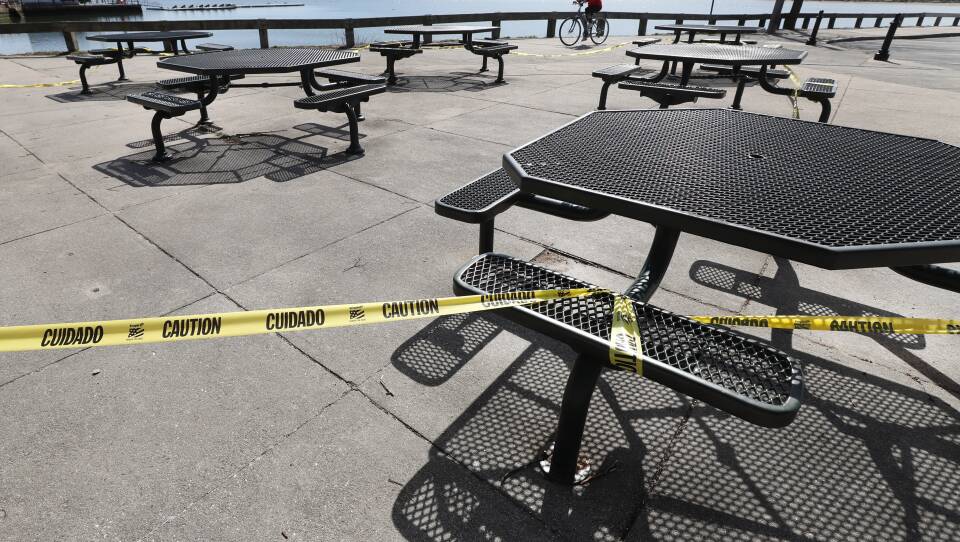Mayor Marty Walsh has implemented a recommended 9 p.m. to 6 a.m. curfew in place for the city of Boston in order to limit the spread of the coronavirus. WGBH Morning Edition host Joe Mathieu spoke with Northeastern University law professor and WGBH legal analyst Daniel Medwed about how the city can or cannot enforce the curfew, and how the new changes because of the pandemic are shifting criminal activity. The transcript below has been edited for clarity.
Joe Mathieu: So we start off with the curfew order here, as I mentioned, began last night in Boston. Recommending, at least, people should stay in their homes 9 p.m. to 6 a.m. And boy, by the looks of the streets in town last night, people were listening. Mayor Walsh's order is thoughtfully and carefully worded [and] its measures largely framed as a matter of how people should, not must, behave. But, Daniel, Boston police do have the power to enforce this order if need be.
Daniel Medwed: That's right. Mayor Walsh's order explicitly countenances the idea of the BPD enforcing recreational sports areas in city parks. That's a key part of this order. The mayor closed down tennis courts, basketball courts, ball fields, places where people tend to congregate, and in the order, he specified that if needed, the Boston Police Department may, and in fact shall, order the dispersal of gatherings and mandate that individuals leave the premises right away.
Mathieu: [Are] you surprised we didn't get more details on kind of how police might enforce this or what penalties might be?
Medwed: Well, that's an interesting question. Not really. I think all along, the mayor has been trying to appeal to our best impulses, to our best selves. He's been using the carrot of social responsibility [and] the carrot of community rather than the stick of threatened criminal punishment. And I think for good reason because, after all, the Boston Police Department presumably has bigger fish to fry than ordering the dispersal of people who are congregating in parks. They have to make sure that their officers are safe, that they haven't contracted COVID-19, and they have to adjust to some very significant possible shifts in criminal activity in the city of Boston.
Mathieu: Daniel, you mentioned possible shifts in criminal activity. What kind of trends are you seeing?
Medwed: Well, of course, we're still relatively early on in this crisis. I know it doesn't feel that way to any of us; it seems like forever since our lives were upended. But in terms of data collection, we're still at a very nascent phase. So here are a couple trends that criminologists and others are noticing.
First, and GBH has already reported on this, we've seen an uptick or a rise in domestic violence incidents. The city of Houston, Texas, for instance, reported 200 more domestic violence calls to 911 in March as opposed to February. That's a 20 percent increase. And there's reason to think that reported calls to 911 are just the tip of the iceberg. Why? Because given the prevalence of shelter in place and stay at home orders, many abusers are now isolating with their victims — with survivors. And those victims might not feel safe calling 911 when the abuser is just down the hall.
Second, some criminologists and others are concerned about an impact or disruption on the illegal narcotics trade — heroin and cocaine — that there might be shortages or changes in pricing. This could affect whether or not addicts have access to their drugs. If not, there could be many people experiencing withdrawal, which is a public health catastrophe. It also could lead to some ancillary criminal activity. Specifically with respect to heroin, it could lead some users to shift to fentanyl, which is a much more potent — I believe 50 times more potent — synthetic opioid and much, much more lethal. So those are just some of the trends that people are talking about.
Mathieu: That comes together to be a pretty scary story when you consider it all, Daniel. How about theft crimes? We saw some stores even boarding up windows in areas they thought might get to looting under extreme circumstances. Has that happened?
Medwed: Well, this is a really interesting part of the criminal activity puzzle. So on the one hand, with fewer people on the streets, there are going to be fewer person-to-person property crimes, fewer robberies — that's when you take property with force or the threat of force — fewer purse snatchings [and] fewer pickpocketing incidents. But on the other hand, with fewer people on the street, there's less community vigilance over property. So we might see more break-ins to cars or to shuttered businesses. In fact, I was interested to look over the Boston Police Department crime statistics for last week. And yes, there were very few robberies reported. But get this, there were many car-related incidents. During one 24 hour period, there were six car thefts in the city of Boston and 11 break-ins to vehicles.





